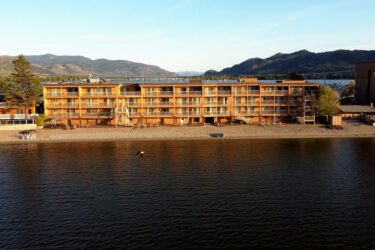
InnVest Hotels acquires The Algonquin Resort St. Andrews by‑the‑Sea, Autograph Collection and The Algonquin Golf Course
InnVest Hotels has acquired The Algonquin Resort St. Andrews by-the-Sea, Autograph Collection and The Algonquin Golf Course.
China’s growth story is historic in its speed and magnitude and is set to continue its record-breaking trajectory in the long term. This makes the understanding of Chinese-Canadian hotel deals crucial in today’s marketplace.

By Lorne Gross
Lorne Gross is the managing lawyer of Lorne Gross & Associates, providing legal services in corporate and real estate law. Phone: 416-453-6596. Email: lorne@lornegross.com.
The acquisition of hotels by purchasers from China is an extremely significant and fast-growing trend in the North American hotel marketplace.
China’s growth story is historic in its speed and magnitude and is set to continue its record-breaking trajectory in the long term. This makes the understanding of Chinese-Canadian hotel deals – and the mutual understanding of parties to these deals – of great importance in today’s marketplace.
Focus on the similarities
Most advice focuses on the differences between the parties of one culture and another. But I believe that rather than looking at differences (which are easier to put into marketable lists), we should also understand the similarities. In many respects, the Chinese buyer is no different than a buyer from Canada. He or she has human desires and motivations, has capital to invest and wishes to maximize return. A Chinese buyers wants to have a hotel attract a maximum number of guests and be managed in the most efficient and appealing way possible.
Often, purchasers from China are within one of two general groups.
The first is an entrepreneur new to the market with few business contacts and very little knowledge of the Canadian marketplace and the second, an investor who has some experience in the Canadian marketplace with several past acquisitions. Of course, all investors may not neatly fit into such categories, but often show traits of these investor types.
The new entrepreneur often (but not always) has a smaller amount of capital to invest, or is only willing to invest a relatively small amount of capital. These investors often seek to purchase an individual hotel or a relatively small property with a flag or recognizable franchise to start with. They also would not typically expect to be responsible for additional expenses to meet PIPs (requirements to improve the hotel based on what a franchisor wants). Such an investor often seeks a ‘turnkey’ operation.
A different type of purchaser is one who has made or is seeking to make a group of acquisitions. Such a purchaser often has experience in the Canadian or international marketplace and is more familiar with the particularities of such a market and its regulations. This investor is often more willing to invest in a hotel with no brand, engage in improvements to meet outstanding PIPs, obtain a flag, or invest in a hotel whose status as a franchisee is in jeopardy and invest in PIPs to re-establish the brand. This type of purchaser may also wish to arrange their own management (within a flag operation) whereas a newer buyer is likely more willing to accept an existing longer term management agreement in place from the hotel chain. This is because, quite understandably, the newer buyer may not have the immediate ability and knowledge to arrange for management.
It is important to recognize the objectives of the Chinese investor you are dealing with. If you are an agent, knowing which category they fall into and knowing the importance of soliciting this information, will assist in finding appropriate targets.
If you are the vendor of an asset, knowing the nature of a potential Chinese buyer will assist you in: (1) seeking buyers with whom you will negotiate most successfully, (2) positioning your property before selling it in order to attract your ideal purchaser and (3) negotiating most successfully with a potential buyer whose background and objectives you understand.
High expectations re cap rates
One additional aspect to consider when dealing with Chinese buyers is their high expectations regarding cap rates. New investors and experienced buyers, may often be quite surprised at the current low cap rate environment. Often, Chinese investors expect higher cap rates based on experiences in other jurisdictions or even based on misrepresentations that local people make to them, to solicit their investment. In seeking the successful completion of a transaction, it is important to helpfully assist such an investor understand the reasons for the current low cap environment, particularly combined with the relatively higher risk of hotels as a real estate asset class.
As a final note, Canadian sellers of hotel assets may find that Chinese purchasers require a longer period of time to complete transactions. This is because of new regulations requiring approval for funds exiting the mainland to make acquisitions. One solution is to create a due diligence exception and time extension, if this circumstance arises. It is important when negotiating with a Chinese party to understand that such a situation is not a ploy on the part of the Chinese investor, nor due to any lack of diligence on their part.



InnVest Hotels has acquired The Algonquin Resort St. Andrews by-the-Sea, Autograph Collection and The Algonquin Golf Course.

The new owners of the famed Windermere House hotel and resort on Muskoka’s Lake Rosseau intend to revitalize the building and its amenities while preserving the property’s historical integrity.

Proactive Hospitality has acquired the Coast Osoyoos Beach Hotel, B.C. CFO Capital arranged acquisition financing for the deal.

Tribute Portfolio – part of Marriott Bonvoy's extraordinary portfolio of 31 hotel brands – continues to grow its global family of characterful hotels with Honeyrose Hotel Montreal, a Tribute Portfolio Hotel, the brand's…